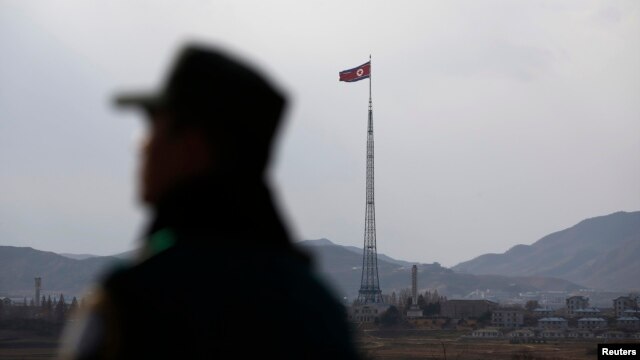
FILE - A North Korean flag flutters on top of a tower at the propaganda village of Gijungdong in North Korea, in this picture taken near the truce village of Panmunjom.
BEIJING—
North Korea on Thursday threatened to carry out a fresh nuclear test in response to a U.N. committee's condemnation of Pyongyang's alleged human rights abuses.
In a statement Thursday, the North's foreign ministry said Pyongyang will be "unable to refrain any longer" from conducting a fourth nuclear test after the United Nations moved to bring the country before the International Criminal Court (ICC) for crimes against humanity earlier this week.
On Thursday China’s Foreign Ministry spokesperson urged all parties to return to dialogue and the six party talks.
Hong Lei said differences on human rights issues should be resolved by all countries via dialogue. He said China’s position is to maintain stability on the peninsula and resolve issues through dialogue.
South Korea condemns threat
South Korean foreign ministry spokesman Noh Kwang-il condemned the North Korean threat.
"If North Korea aggravates the situation with nuclear threats towards the international community, it will be considered a violation of the United Nations Security Council resolution. We warn North Korea that it will face a firm response," Noh said.
China voted against the resolution and will likely veto any action to refer North Korea to the ICC. China, a longtime ally of North Korea, returns North Korean refugees who are caught fleeing across their shared border.
Many of these refugees said they are fleeing what the U.N. described in a report earlier this year as “unspeakable atrocities.”
The U.N. has detailed the use of labor camps, torture, rape and abductions by the North Korean government.
North Korea has called these allegations a “political provocation” and said the U.N. resolution was based on "fabricated testimonies" from North Korean defectors.
Thursday, North Korea released a statement on government run television.
The North Korean news reader said hostile U.S. policy toward the Democratic People's Republic of Korea compels North Korea to not refrain any longer from conducting a new nuclear test.
The reader said the principal architect of the U.N. resolution and their colleagues will be held wholly responsible for all the consequences of the resolution’s adoption.
Evidence of possible test
Even before North Korea's announcement, researchers who study the country's nuclear program reported this week that preparations for another nuclear test explosion could be underway.
Analysts from the U.S.-Korea Institute at Johns Hopkins University's School of Advanced Individual Studies (SAIS) say a reactor at the North's main Yongbyon nuclear complex has been shut down for 10 weeks - much longer than usual for routine maintenance. That could mean some of the reactor's spent fuel rods have been removed for reprocessing, which would convert the reactor fuel into weapons-grade plutonium.
The U.S.-Korea Institute and other institutions also report evidence from satellite photographs and other observations that a "radiochemical laboratory" at the Yongbyon site - the specific facility that would reprocess reactor fuel into plutonium - is being returned to service after months of inactivity.
The U.N. committee resolution must now be approved by the wider General Assembly. It could then head to the Security Council, where China and Russia hold crucial veto votes.
The two countries have in the past protected the North at the Security Council.
North Korea conducted nuclear bomb tests in 2006, 2009 and 2013. The country last reprocessed spent fuel in 2009 before conducting its second nuclear test. |
|
